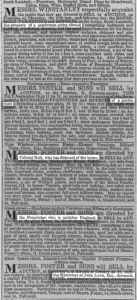
by Elizabeth Coggin Womack
For almost two hundred years, advertisements in the Times of London combined listings of real estate and secondhand furnishings with oblique references to deaths or bankruptcies. The gossipy subtext of these advertisements made them a particularly rich source for satirical allusions in nineteenth-century novels. Yet for Thackeray and Dickens, this form of satire is also an invitation to read more sympathetically. When Thackeray and Dickens use hackneyed commercial phrasing such as “Capital Modern Household Furniture, &c.” to describe a family’s tragic loss, they ask us to reconsider the habitual schadenfreude that gossipy advertisements might encourage, and instead to bring a novel-reader’s sympathy to bear on the most mundane section of the daily newspaper.
While Thackeray’s Vanity Fair and Dickens’s Dombey and Son are the primary sources for my work on nineteenth-century auction advertisements, my unofficial inspiration has always been a scene from When Harry Met Sally (1989). Strolling with Sally on a crisp autumn day, the ever-cynical Harry recommends using the obituaries to find a New York City apartment. “What they can do to make it easier is to combine the obituaries with the real estate section. Say, then you’d have ‘Mr. Klein died today leaving a wife, two children, and a spacious three-bedroom apartment with a wood-burning fireplace.’” What Harry means as a morbid joke was once an established convention for auction advertisements.
To learn more, see Elizabeth Coggin Womack: “Nineteenth-Century Auction Narratives and Compassionate Reading”
